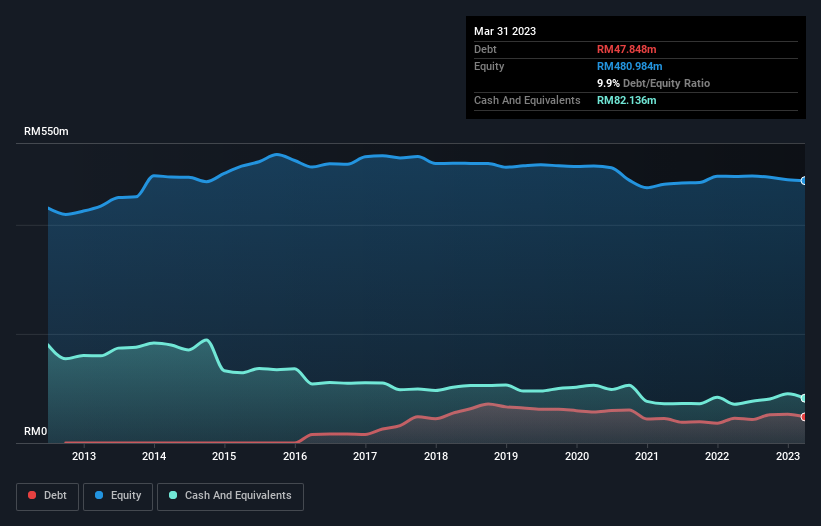Is GUH Holdings Berhad (KLSE:GUH) A Risky Investment?
Howard Marks put it nicely when he said that, rather than worrying about share price volatility, 'The possibility of permanent loss is the risk I worry about... and every practical investor I know worries about.' When we think about how risky a company is, we always like to look at its use of debt, since debt overload can lead to ruin. We can see that GUH Holdings Berhad (KLSE:GUH) does use debt in its business. But is this debt a concern to shareholders?
When Is Debt Dangerous?
Debt is a tool to help businesses grow, but if a business is incapable of paying off its lenders, then it exists at their mercy. Ultimately, if the company can't fulfill its legal obligations to repay debt, shareholders could walk away with nothing. However, a more usual (but still expensive) situation is where a company must dilute shareholders at a cheap share price simply to get debt under control. Having said that, the most common situation is where a company manages its debt reasonably well - and to its own advantage. When we examine debt levels, we first consider both cash and debt levels, together.
Check out our latest analysis for GUH Holdings Berhad
What Is GUH Holdings Berhad's Debt?
As you can see below, at the end of March 2023, GUH Holdings Berhad had RM47.8m of debt, up from RM45.6m a year ago. Click the image for more detail. However, it does have RM82.1m in cash offsetting this, leading to net cash of RM34.3m.

How Strong Is GUH Holdings Berhad's Balance Sheet?
The latest balance sheet data shows that GUH Holdings Berhad had liabilities of RM79.6m due within a year, and liabilities of RM46.5m falling due after that. Offsetting these obligations, it had cash of RM82.1m as well as receivables valued at RM54.8m due within 12 months. So it can boast RM10.7m more liquid assets than total liabilities.
This short term liquidity is a sign that GUH Holdings Berhad could probably pay off its debt with ease, as its balance sheet is far from stretched. Succinctly put, GUH Holdings Berhad boasts net cash, so it's fair to say it does not have a heavy debt load! There's no doubt that we learn most about debt from the balance sheet. But it is GUH Holdings Berhad's earnings that will influence how the balance sheet holds up in the future. So when considering debt, it's definitely worth looking at the earnings trend. Click here for an interactive snapshot.
In the last year GUH Holdings Berhad had a loss before interest and tax, and actually shrunk its revenue by 7.6%, to RM262m. That's not what we would hope to see.
So How Risky Is GUH Holdings Berhad?
While GUH Holdings Berhad lost money on an earnings before interest and tax (EBIT) level, it actually generated positive free cash flow RM12m. So although it is loss-making, it doesn't seem to have too much near-term balance sheet risk, keeping in mind the net cash. With mediocre revenue growth in the last year, we're don't find the investment opportunity particularly compelling. There's no doubt that we learn most about debt from the balance sheet. But ultimately, every company can contain risks that exist outside of the balance sheet. For example, we've discovered 1 warning sign for GUH Holdings Berhad that you should be aware of before investing here.
At the end of the day, it's often better to focus on companies that are free from net debt. You can access our special list of such companies (all with a track record of profit growth). It's free.
New: Manage All Your Stock Portfolios in One Place
We've created the ultimate portfolio companion for stock investors, and it's free.
• Connect an unlimited number of Portfolios and see your total in one currency
• Be alerted to new Warning Signs or Risks via email or mobile
• Track the Fair Value of your stocks
Have feedback on this article? Concerned about the content? Get in touch with us directly. Alternatively, email editorial-team (at) simplywallst.com.
This article by Simply Wall St is general in nature. We provide commentary based on historical data and analyst forecasts only using an unbiased methodology and our articles are not intended to be financial advice. It does not constitute a recommendation to buy or sell any stock, and does not take account of your objectives, or your financial situation. We aim to bring you long-term focused analysis driven by fundamental data. Note that our analysis may not factor in the latest price-sensitive company announcements or qualitative material. Simply Wall St has no position in any stocks mentioned.
About KLSE:GUH
GUH Holdings Berhad
An investment holding company, engages in the electronic, property development, and utilities businesses in Malaysia, China, Indonesia, Singapore, and internationally.
Excellent balance sheet and slightly overvalued.
Market Insights
Weekly Picks


Crazy Undervalued 42 Baggers Silver Play (Active & Running Mine)


Fiducian: Compliance Clouds or Value Opportunity?

Willamette Valley Vineyards (WVVI): Not-So-Great Value
Recently Updated Narratives

THE KINGDOM OF BROWN GOODS: WHY MGPI IS BEING CRUSHED BY INVENTORY & PRIMED FOR RESURRECTION


The "Molecular Pencil": Why Beam's Technology is Built to Win


ADNOC Gas future shines with a 21.4% revenue surge
Popular Narratives


MicroVision will explode future revenue by 380.37% with a vision towards success


NVDA: Expanding AI Demand Will Drive Major Data Center Investments Through 2026




